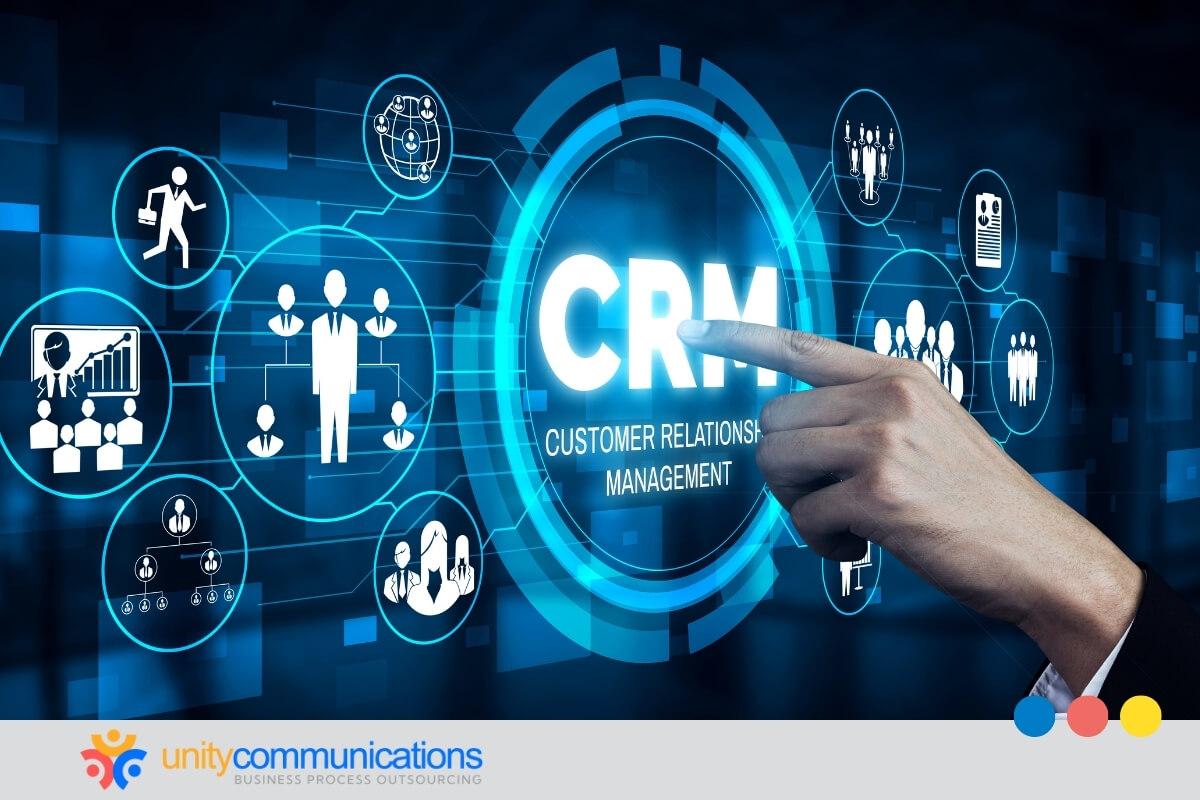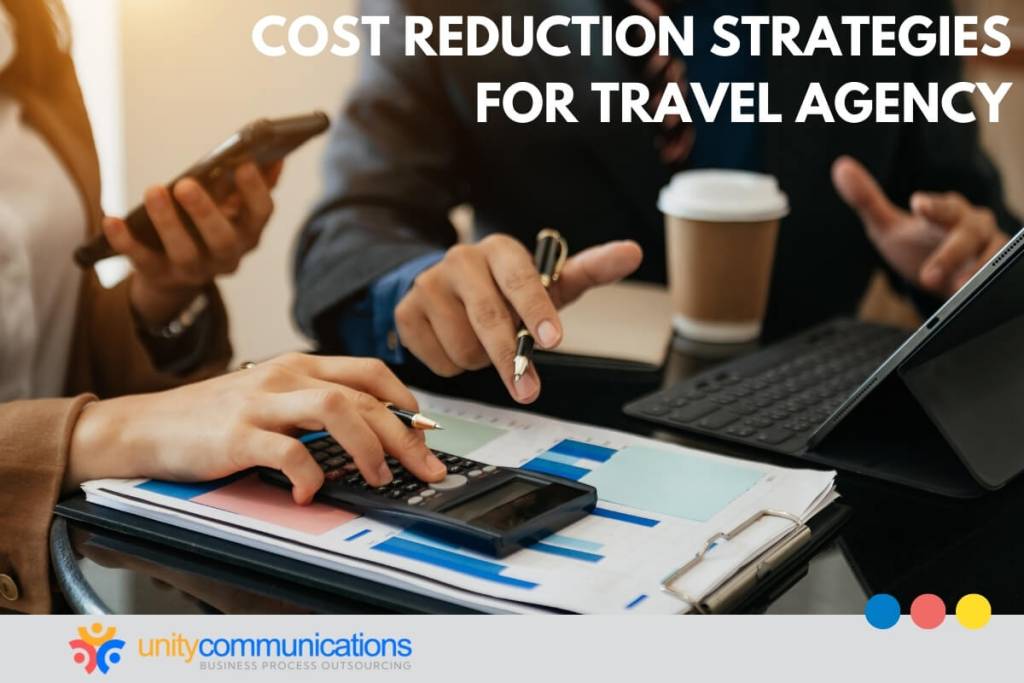Table of Contents
Cost efficiency gives travel agencies a competitive edge in the fierce tourism and hospitality industry. To achieve this, they leverage technology and automation, partner with suppliers, and adopt remote work.
However, due to its effectiveness, business process outsourcing (BPO) emerges as a top solution. In fact, 83% of executives report cutting costs after outsourcing.
If you’re looking for the best cost-reduction strategy for your travel agency, this article is for you. It explores the different ways to reduce expenses and increase savings, from strategic partnerships to travel BPO.
1. Leverage advanced technology and automation

One way to reduce costs is to invest in advanced technology and automation to enhance operational efficiency and productivity. Streamlining processes offsets expenses, reduces resource consumption, and reduces costly mistakes.
This cost-reduction strategy helps your travel agency provide positive customer support experiences, translating into exceptional customer service and increased profitability.
To better understand how this creates a domino effect, let’s first answer the question: What is customer support experience? It is the overall quality of a consumer’s impression of your support services, whether good or bad.
Lousy customer support experiences caused by long wait times, inaccuracies, or inefficient services can be expensive. According to Pindrop, a fraud detection company, 60% of customers will switch travel brands after just one to two bad experiences. This leads to lost revenue and increased customer acquisition costs.
Advanced technology and automation help eliminate this challenge and lead your travel agency toward significant cost savings.
Here are some tools to invest in:
- Booking systems to automate flight, hotel, and car rental reservations and scheduling. This eliminates manual errors, reduces processing time, and allows for efficient booking management.
- Customer relationship management (CRM) software to manage customer interaction, track preferences, and personalize services. This streamlines operations to save time and tailors services, which increases revenue.
- Marketing automation to automate email marketing, social media campaigns, and content creation. This reduces manual labor and human errors, reducing costly delays and mistakes.
- Mobile apps to provide customers with 24/7 access to booking information, itineraries, and support. This enhances efficiencies, which leads to increased customer satisfaction and reduced customer turnover.
- Artificial intelligence (AI) to automate predictive analysis, streamline data analytics, provide instant customer support, and assist with booking tasks. This helps inform marketing decisions and boosts efficiencies, improving customer satisfaction and increasing revenue.
However, some of these technologies can be expensive to set up and maintain. Calculate your return on investment (ROI) before investing.
2. Consider strategic supplier partnerships and consolidation
Consolidating airlines, hotels, car rental companies, and other relevant tourism and hospitality service providers can significantly reduce costs.
It gives you a unique position and bargaining power to secure favorable rates, terms, and conditions. You can easily enter into long-term contracts. Such partnerships help you secure favorable rates for an extended period, providing stability.
This approach also lets you leverage economies of scale, which are cost benefits achieved through efficient and large production. As the quantity purchased increases, the cost per unit often decreases.
Here are some prominent advantages of consolidating tourism and hospitality service vendors, which make it an effective cost-reduction strategy for your travel agency:
- Increased hotel bookings: By working with fewer hotel suppliers, travel agencies can often enjoy bulk purchase discounts from hotels.
- Consolidated flight bookings: Partnering with fewer airlines can result in larger flight bookings, potentially securing lower fares or additional benefits such as complimentary upgrades.
- Bundled services: Consolidating service providers can allow agencies to offer discounted bundled packages (e.g., flight, hotel, and car rental).
- Shared marketing costs: Your partner supplier might offer shared marketing costs or co-op advertising opportunities to agencies that generate significant business.
- Priority service: Larger-volume customers often receive priority services, such as faster booking confirmations and dedicated account managers.
3. Adopt remote and hybrid work arrangements

Running a physical office requires a significant budget, especially if you have a large workforce. Here are a few ways remote and hybrid work arrangements can be an effective cost-reduction strategy for your travel agency:
Reduced rent and overhead costs
By allowing employees to work remotely or in a hybrid model, agencies can significantly reduce their need for office space. This means you can save on rent, which could surge at a compound annual growth rate (CAGR) of 7.2% by 2027.
It also helps you avoid the following costs of managing and maintaining a physical office:
- Office equipment (e.g., printers, scanners, computers, furniture, telephone and communication systems, and network equipment)
- Property utilities (e.g., electricity, water, internet, sewage systems, and heating, ventilation, and air-conditioning [HVAC] systems)
- Maintenance services (e.g., cleaning, janitorial services, security services, information technology [IT] maintenance, HVAC maintenance, and pest control)
Improved efficiency and productivity
As previously mentioned, streamlining processes can positively affect cost-saving efforts. Remote work also provides this benefit. Employees working under such conditions save time by avoiding commutes.
Employees working from home or in hybrid settings can also find more productive work environments tailored to their individual preferences. Such flexible arrangements can improve employees’ work-life balance and reduce burnout, which often leads to errors and delays.
Better access to talent and lower turnover
This cost-reduction strategy can give your travel agency a competitive edge in attracting top talent, especially in today’s tight labor market. You don’t have to spend significantly on benefits packages or increase salaries to find competent travel agents.
Additionally, remote and hybrid setups reduce costly employee turnover, recruitment, onboarding, and training for new employees.
4. Outsource non-core travel agency processes

BPO helps businesses reduce costs. According to Deloitte’s 2023 survey, 83% of executives cut expenses after outsourcing.
But what is BPO? It is the practice of delegating front- and back-office tasks to a qualified and specialized third-party team. As one of the cost-reduction strategies for your travel agency, it provides the following benefits:
- Streamlined operations: The nature of outsourcing helps you enhance efficiency and productivity as with leveraging technology and automation.
- Flexible work arrangements: Outsourcing entails remote work, minimizing overhead and employee turnover rates.
- Strategic partnerships: Most travel outsourcing providers have a vast network of suppliers, allowing you to enjoy economies of scale.
However, BPO in travel and tourism offers more cost advantages than these approaches. Let’s explore the other ways this practice can help your travel agency achieve better cost savings:
Fewer technology investments
Travel BPO service providers carry the latest tools relevant to the industry. Examples include booking software, artificial intelligence (AI), customer relationship management (CRM) tools, and more. They let their clients use these technologies; that’s how outsourcing works.
They seamlessly integrate their tools into your systems, so you don’t have to change processes. This feature of outsourcing lets you avoid large upfront investments, significant purchases, and long-term subscriptions for such technologies.
Lower labor costs
Outsourcing providers actively recruit talent from countries with lower costs of living, such as the Philippines and Mexico. This translates to lower wage ranges and savings on salary costs. For example, the monthly average salary of a travel agent from the Philippines is around $415. That is almost ten times lower than a U.S. agent’s $4,100 pay.
Additionally, outsourcing providers cover the costs of hiring new agents, including creating job postings, onboarding, and training. They also shoulder the responsibility of finding and purchasing competitive benefits packages.
Increased focus on core competencies
With qualified professionals and technologies handling time-consuming tasks, you can reallocate resources to more important activities. By focusing on your core strengths, you can identify and eliminate redundant tasks or departments not directly related to your business.
This cost advantage also helps you make more informed decisions about your services and strategies, reducing unnecessary expenses for your travel agency. It also helps minimize failure and associated costs, empowers you to invest in research and development, and reduces expenses through innovation.
The bottom line

Your travel agency doesn’t have to sacrifice quality to reduce costs. Leveraging technologies, consolidating suppliers, adopting remote work, and outsourcing can help cut expenses while maintaining or improving your level of service.
These strategies can help streamline processes, gain unique discounts, attract top talent, and lower employee turnover, increasing profitability.
However, finding the right strategy that meets your needs and goals maximizes these solutions’ cost advantages.
If you think outsourcing is your travel agency’s best cost-reduction strategy, let’s connect!




